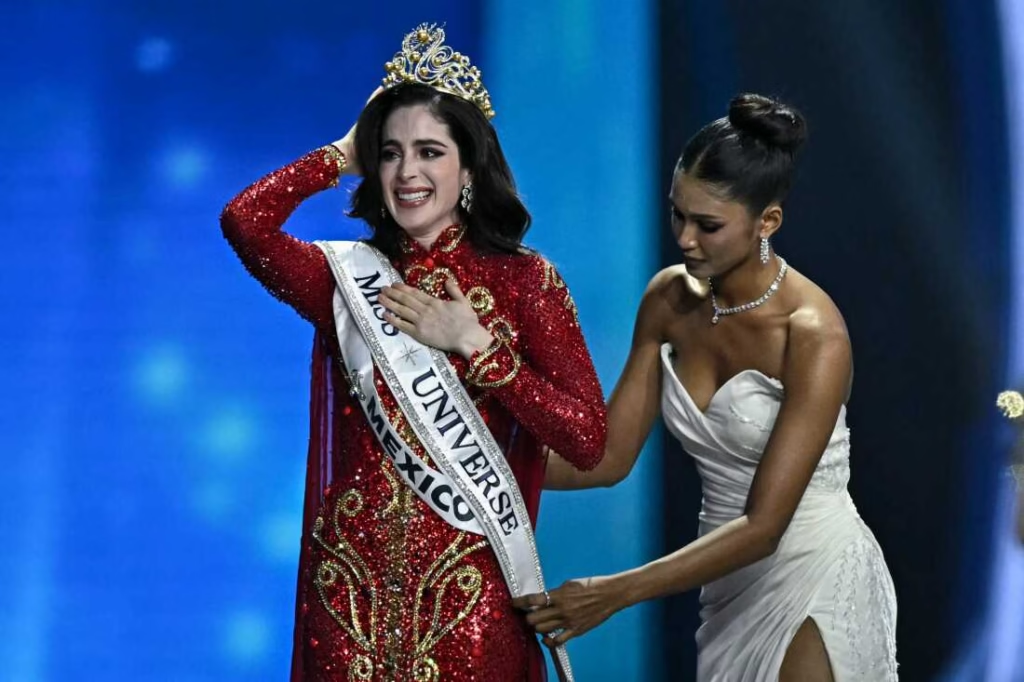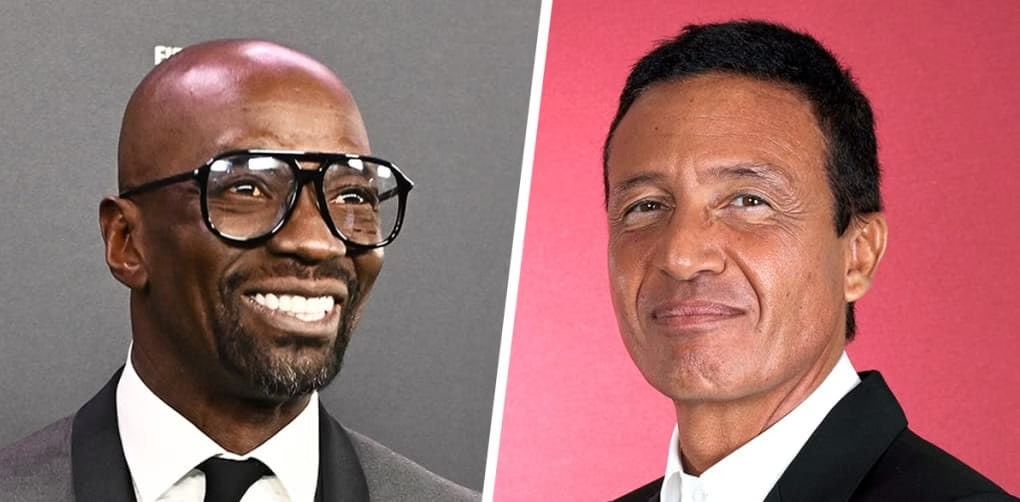NONTHABURI – In a glittering yet deeply divided finale at Challenger Hall, 25-year-old Fátima Bosch Fernández of Mexico was crowned Miss Universe 2025 on Friday night. Her win did not receive universal applause. Instead, cheers from Mexican fans clashed with loud boos and thumbs-down signs from parts of the crowd.
The 74th Miss Universe competition, held just outside Bangkok, felt more like a tense drama than a simple beauty pageant. Empowerment speeches, viral walkouts, abrupt judge resignations, and public spats all swirled around the event.
As Bosch, a humanitarian and sustainable fashion advocate from Tabasco, accepted the crown from outgoing Miss Universe Victoria Kjær Theilvig of Denmark, the atmosphere in the arena crackled with division.
Supporters roared for Bosch, while critics shouted that the decision was fixed. The live broadcast reached millions around the globe and closed a chaotic few weeks that pushed the organisation into the spotlight for all the wrong reasons.
Bosch’s journey to the title was far from smooth. Just two weeks earlier, she became a central figure in a storm over alleged bullying by pageant officials. Many thought her chances had collapsed. Instead, that moment of defiance became her turning point and helped her rise above 136 other contestants.
Miss Thailand, Veena Praveenar Singh, a 29-year-old lawyer and clear crowd favourite in the host country, finished as first runner-up. Venezuela’s Stephany Adriana Abasali Nasser claimed the second runner-up spot.

A Confrontation That Sparked a Walkout
Tension had been building well before the finale confetti hit the floor. On 4 November, during a livestreamed sashing ceremony at the contestants’ Bangkok hotel, Miss Universe Thailand’s national director, Nawat Itsaragrisil, publicly confronted Bosch.
Itsaragrisil, a Thai media boss and co-owner of the Miss Universe Organisation, accused Bosch of refusing to post promotional content about Thailand on her social media accounts. He claimed she was not supporting the host country enough.
Holding a microphone in front of the assembled contestants, he criticised her for not following orders from her national director. “If you listen to your director, you’re a dumbhead,” he snapped, his words echoing around the room of contestants waiting in their sashes.
Bosch tried to defend herself, but he cut her off several times, then called security to escort her out.
What happened next turned into a powerful show of solidarity. Bosch stood up and walked out, heels striking the floor in a steady rhythm. One by one, more than a dozen contestants followed her, including the reigning Miss Universe, Victoria Kjær Theilvig. Her decision to leave alongside Bosch gave the moment even more weight.
“This is about women’s rights,” Theilvig later told reporters. “No one should be humiliated like that.”
The clip, streamed on the Miss Universe Thailand Facebook page, went viral and drew millions of views. People around the world debated respect, workplace bullying, and how women are treated in high-pressure spaces.
Outside the venue, Bosch spoke calmly to the press. “What your director did is not respectful; he called me dumb,” she said. “If something takes away your dignity, you need to go.”
The confrontation threw a harsh light on fractures inside the organisation, which has been co-owned since 2023 by Thai company JKN Global Media and Mexican businessman Raúl Rocha Cantú.
Rocha posted an angry six-minute video on Instagram, condemning what he called Itsaragrisil’s “public aggression” and describing it as “serious abuse”. He promised to defend the contestants’ dignity.
Mexico’s President, Claudia Sheinbaum, also commented, praising Bosch as an example of a woman who speaks up when treated unfairly.
The next day, during a preliminary event, 60-year-old Itsaragrisil appeared on stage in tears. He blamed stress for his outburst and claimed he had meant to say “damage” rather than “dumbhead”.
By then, the backlash was in full swing. The Miss Universe Organisation quietly removed him from an active role and brought in other executives to manage the remaining stages of the competition.
Judges Quit and Fuel Claims of Fixing
As final rehearsals picked up speed, another scandal erupted. On 18 November, just a few days before the live show, Lebanese-French composer Omar Harfouch resigned from the judging panel and made public claims about what he saw behind the scenes.
On Instagram, Harfouch alleged that an “impromptu jury” had secretly chosen the top 30 contestants from the original 136 entrants. He said this shadow group had conflicts of interest, including personal links to some candidates, and that their picks sidelined the official panel of eight judges.
He called the situation “global-scale fraud” and hinted that he might sue over emotional distress and damage to his reputation.
Only hours later, former French football star Claude Makélélé also quit, citing “unforeseen personal reasons” in a short Instagram post.
A third judge, Italy’s Princess Camilla di Borbone delle Due Sicilie, also withdrew, though she did not give a detailed explanation.
The Miss Universe Organisation moved fast to answer Harfouch’s accusations. In a statement, they said he had confused the process with separate judging for the “Beyond the Crown” social impact programme. They insisted that all scoring followed clear and transparent rules and banned Harfouch from any future role with the brand.
Even with the official response, the damage to public trust lingered. Fans online speculated about hidden favouritism, especially after Bosch’s odds of winning shot up following the walkout saga.
“From victim to victor, too convenient?” read one tweet that spread widely on social media, echoing both suspicion online and the mixed reaction in the Bangkok arena.
A Miss Universe Crown Won Amid Cheers and Jeers
Friday night’s final at the 12,000-seat Challenger Hall delivered glamour, drama, and open disagreement in equal measure.
Contestants took to the stage in eye-catching national costumes. Miss Palestine, Nadeen Ayoub, wore a gown decorated with olive branches to symbolise peace. Miss Angola paid tribute to her roots with bold mudcloth patterns.
After the national costume round, the swimsuit and evening gown segments narrowed the group to a top five.
Bosch stood out in the question-and-answer portion. She spoke about her goal to create “safe spaces for women” and promised to use her platform to highlight women whose voices are often ignored. “Believe in the power of your authenticity,” she said. “Your dreams matter, your heart matters.”
When host Steve Byrne announced Bosch as Miss Universe 2025, Mexican flags filled the air, and screams of joy erupted from her supporters.
But the celebration came with a sharp undertone. Loud boos rang out from parts of the crowd who had backed Thailand’s Veena Praveenar Singh. Many local fans believed Singh had delivered a stronger performance and deserved the crown.
Several spectators flashed thumbs-down gestures. Others shouted “Jalisco!” in reference to the controversy that surrounded Bosch’s earlier national title win at Miss Universe Mexico, where some fans had also questioned the result.
Bosch did not flinch. She hugged Victoria Kjær Theilvig tightly as the outgoing queen whispered words of support into her ear. Then she faced the audience and cameras.
“I want to be remembered as a real person who gives the heart,” she said, her voice steady over the noise in the hall.
Bosch grew up in Tabasco and later studied fashion in both Mexico and Italy. She built her career around sustainable design, creating pieces from discarded or leftover materials.
Now, with a reported 250,000 prize package and a year-long reign, she plans to focus on women’s empowerment and ethical fashion. Her win closes a season that pushed Miss Universe to live up to its own talk about respect and representation.
As Bosch walked off stage, surrounded by supporters and fellow contestants, the boos began to fade into the background. In a night marked by disputes, accusations, and hard questions, she walked away with the crown that many felt had been forged in fire.














